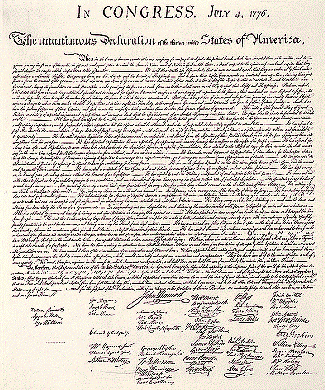 "Books
are not absolutely dead things, …they are lively, and as vigorously productive,
as those fabulous dragon’s teeth; and being sown up and down, may chance to
spring up armed men." --Milton, Areopagitica
"Books
are not absolutely dead things, …they are lively, and as vigorously productive,
as those fabulous dragon’s teeth; and being sown up and down, may chance to
spring up armed men." --Milton, Areopagitica Lecture: "Declaring Independence"
 "Books
are not absolutely dead things, …they are lively, and as vigorously productive,
as those fabulous dragon’s teeth; and being sown up and down, may chance to
spring up armed men." --Milton, Areopagitica
"Books
are not absolutely dead things, …they are lively, and as vigorously productive,
as those fabulous dragon’s teeth; and being sown up and down, may chance to
spring up armed men." --Milton, Areopagitica
 Title:
IN CONGRESS,
July 4, 1776. The unanimous Declaration of the thirteen united States of America
Jefferson wrote a draft of the Declaration in June
1776. It was accepted with a few revisions in July 1776. (A critique of the
slave trade was removed.) Here is the Declaration with line breaks where
Jefferson divided it. Jefferson used quotation marks to show those places where
a speaker should pause. These were reproduced in the first printed edition of
the Declaration, known as the Dunlop broadside.
Title:
IN CONGRESS,
July 4, 1776. The unanimous Declaration of the thirteen united States of America
Jefferson wrote a draft of the Declaration in June
1776. It was accepted with a few revisions in July 1776. (A critique of the
slave trade was removed.) Here is the Declaration with line breaks where
Jefferson divided it. Jefferson used quotation marks to show those places where
a speaker should pause. These were reproduced in the first printed edition of
the Declaration, known as the Dunlop broadside.
I: Preamble describes the extra-ordinary context for the declaration:
When in the Course of human events, it becomes necessary for one people
to dissolve the political bands which have connected them with another,
and to assume among the powers of the earth, the separate and equal station
to which the Laws of Nature and of Nature's God entitle them,
a decent respect to the opinions of mankind requires
that they should declare the causes which impel them to the separation.
II: Declares self-evident truths (equality, rights); which govenment is instituted to secure; when it doesn't it may be overthrow and reconstituted
We hold these truths to be self-evident,
that all men are created equal,
that they are endowed by their Creator with certain unalienable Rights,
that among these are Life, Liberty and the pursuit of Happiness.
--That to secure these rights, Governments are instituted among Men,
deriving their just powers from the consent of the governed,
--That whenever any Form of Government becomes destructive of these ends,
it is the Right of the People to alter or to abolish it, and to institute new Government, laying its foundation on such principles and organizing its powers in such form, as to them shall seem most likely to effect their Safety and Happiness.
III: List of grievances against King George of England
The history of the present King of Great Britain is a history of repeated injuries and usurpations,
all having in direct object the establishment of an absolute Tyranny over these States.
To prove this, let Facts be submitted to a candid world. ...
He has plundered our seas, ravaged our coasts, burnt our towns, and destroyed the loves of our people...
He has excited domestic insurrections amongst us, and has endeavoured to bring on the inhabitants of our frontiers, the merciless Indian Savages, whose known rule of warfare, is an undistinguished destruction of all ages, sexes and conditions.
IV: We have sought to speak, but have not been heard
Nor have We been wanting in attentions to our Brittish brethren.
We have warned them from time to time of attempts by their legislature to extend an unwarrantable jurisdiction over us.
We have reminded them of the circumstances of our emigration and settlement here.
We have appealed to their native justice and magnanimity, ...
They ... have been deaf to the voice of justice ....
(therefore) We hold them....as we hold the rest of mankind, enemies in war, in peace friends.
V: Performative: we declare that the "united colonies are and ought to be free and independent states" and that the "political connection between them and the state of Great Britain, is and ought to be totally dissolved;"
We, therefore, the Representatives of the united States of America, in General Congress, Assembled,
appealing to the Supreme Judge of the world for the rectitude of our intentions,
do, in the Name, and by Authority of the good People of these Colonies, solemnly publish and declare,
That these United Colonies are, and of Right ought to be Free and Independent States;
that they are Absolved from all Allegiance to the British Crown,
and that all political connection between them and the State of Great Britain, is and ought to be totally dissolved;
and that as Free and Independent States,
they have full Power to levy War, conclude Peace, contract Alliances, establish Commerce, and to do all other Acts and Things which Independent States may of right do.
And for the support of this Declaration, with a firm reliance on the protection of divine Providence, we mutually pledge to each other our Lives, our Fortunes and our sacred Honor.
***
Final paradox: the Declaration has to bring the State into existence so that the Declaration will have true authority and force.
Question: is the Declaration and Enlightenment text? In what ways is it? It what ways is it not? See "the Debate about Enlightenment"